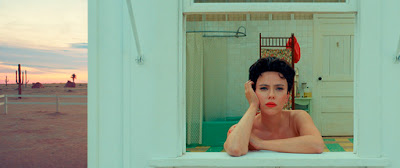Much of “Asteroid City” takes place circa 1955 in the small eponymous American Southwest town semi-famous for a meteorite that crashed there round about 3000 BC and set to host a junior stargazers conference. This brings several bright students and their parents, including Woodrow Steenbeck (Jake Ryan) and his father Augie (Jason Schwartzman), trying to find wherewithal to tell his son and triplet daughters of their mother’s recent death, and Dinah Campbell (Grace Edwards) and her mother Midge (Scarlett Johansson), a famous actress emotionally reeling from divorce. All this suggests Wilder’s Our Town told by interlopers rather than inhabitants, underlining the movie’s defining sense of alienation and fear, where the notion of looking to the sky isn’t necessarily filled with wonder but mushroom clouds from recurring atomic tests and mysterious lights, the latter eventually yielding an otherworldly encounter prompting a militarized quarantine. And when Asteroid City is sealed off, notably it’s the kids who fight back while the adults mostly stand around sipping at gin and vermouth from a martini vending machine, a three-martini lunch as life.
That, however, is only half the movie as “Asteroid City” makes no attempt to pretend that Asteroid City is real. I don’t mean real to us, the viewer, but real in the movie’s own world. Because “Asteroid City” opens in black and white on a stage where a Rod Serling-like narrator (Bryan Cranston) looks right into the camera and explains that what we are about to see is a behind the scenes look at the production of a play called Asteroid City, introducing us to the writer (Edward Norton) and director (Adrien Brody) and cast, all of whom are the actors playing the characters in the desert town. In true Andersonian fashion, however, this is not merely a framing device but a means of exploration.
If “The French Dispatch” utilized its fictional eponymous periodical to evince something like Anderson’s mission statement of creative freedom and intent, then in “Asteroid City” he uses the stage bound establishing device to dissect and push back against his own perceived theatrical sensibilities. The narrow aspect ratio and monochrome of the stage scenes blossom into rich Kodak 35mm anamorphic widescreen that makes great use of both close-ups and detail-rich frames, like the lonely cactus dotting the periphery of conversations between Midge and Augie from the windows of their respective rental homes, while a static camera gives way to a three-dimensional one, constantly probing, seeming to forever pan right, again, looking for something else.
The acting, meanwhile, is no less concentrated than everything else. Unlike, say, Gene Hackman in “The Royal Tenenbaums” or Bill Murray in “The Life Aquatic,” the actors of “Asteroid City” deliberately eschew any idiosyncrasy, or actorly business, as Brody’s director puts it. Hey, I happen to like actorly business, but I like the absence of it too, and here the absence of it brings home the director is sculpting the performance as much as the performer. Johansson especially benefits, honoring the old Antonioni observation that an actor need only be on screen, reducing all sense of actorly intent until there’s virtually no barrier between her and the camera, not so much conveying her character’s tragicomic essence as beaming it directly to us.
Like Midge is an actor, Augie is a photographer, snapping photos throughout, evoking a desire for an artist to use his or her art to make sense of the world. Rather than mere refraction of this truth, however, the framing scenes become intertwined with it, as the division between the reality and fiction the movie presents is increasingly blurred in amusing and moving ways, bringing creators and creations in harmony with one another. Occasionally, “Asteroid City” goes even further than that, such as a balcony scene existing as both a dazzling metaphor for the old creative’s adage of killing your darlings and weirdly profound metaphor of loss, crystallizing the movie as one that does not simply understand but dramatically demonstrates how all art rests on the knife’s edge between artifice and emotion.





No comments:
Post a Comment